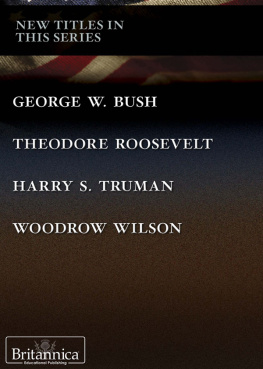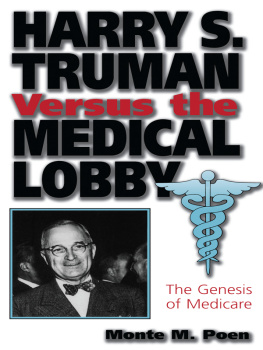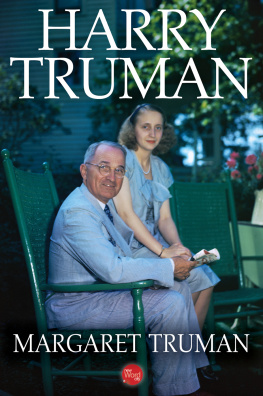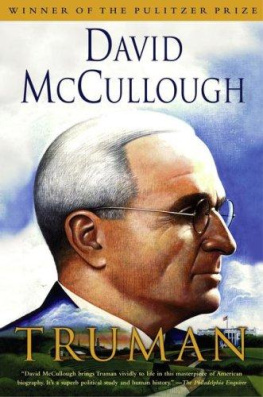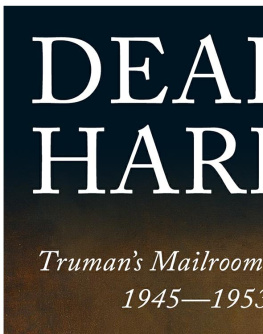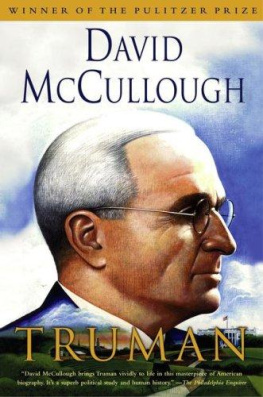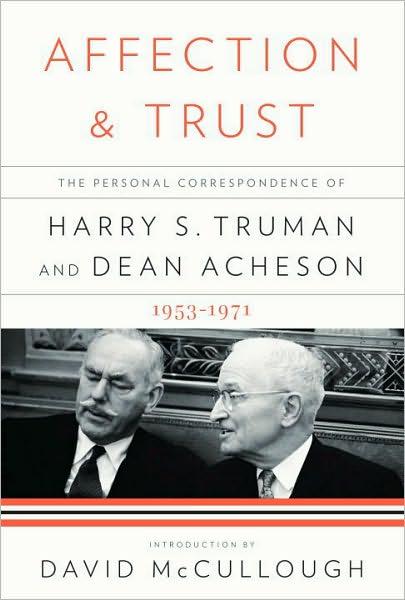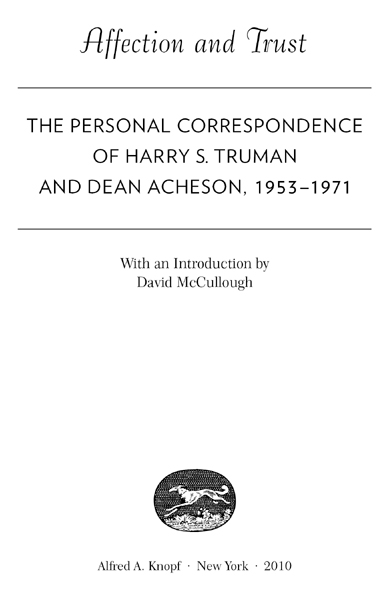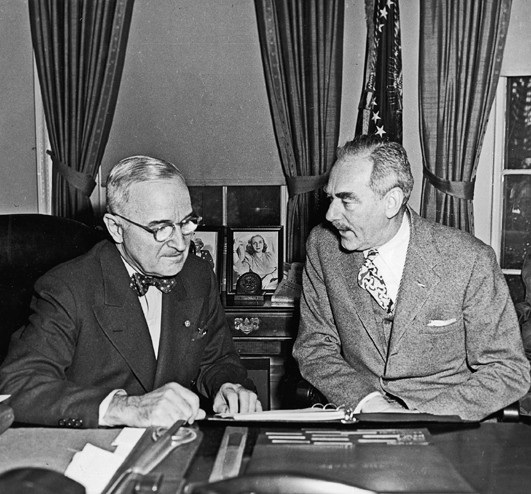
Harry Truman with Dean Acheson in the Oval Office on December 21, 1950, discussing Achesons meetings with foreign and defense ministers of North Atlantic Treaty Organization (NATO) countries in Brussels, Belgium.
THIS IS A BORZOI BOOK
PUBLISHED BY ALFRED A. KNOPF
Copyright 2010 by The Truman Library Institute
All rights reserved. Published in the United States by Alfred A. Knopf, a division of Random House, Inc., New York, and in Canada by Random House of Canada Limited, Toronto.
All photographs are used courtesy of The Truman Library Institute.
www.aaknopf.com
Knopf, Borzoi Books, and the colophon are registered trademarks of Random House, Inc.
Library of Congress Cataloging-in-Publication Data
Truman, Harry S., 18841972.
Affection and trust : the personal correspondence of Harry S. Truman and Dean Acheson, 19531971 / by Harry S. Truman and Dean Acheson ;
edited by Ray Geselbracht and David C. Acheson.1st ed.
p. cm.
eISBN: 978-0-307-59462-4
1. Truman, Harry S., 18841972Correspondence. 2. Acheson, Dean, 18931971Correspondence. 3. United StatesPolitics and government19451953Sources. 4. United StatesForeign relations19451953Sources. I. Acheson, Dean, 18931971. II. Geselbracht, Raymond H. III. Acheson, David C. IV. Title.
E814.A4 2010
973.918dc22
2010016904
v3.1
Contents

1. February to December 1953
A New Outlet for the Truman-Acheson Front
2. January 1954 to April 1955
Eisenhowers Foreign Policy Musings on History and Government Trumans Memoirs A Serious Operation The Truman Library Visits in Kansas City and Washington Testimony and Tough Political Talk
3. June to August 1955
A Blunt Critique of Trumans Memoirs
4. August 1955 to September 1956
The Potsdam Papers Intellectual Prostitutes Margaret Is Married A Trip to Europe
5. November 1956 to December 1957
Foreign-Policy and Civil-Rights Crises A Meeting in Washington More Politics The S
6. January 1958 to June 1959
Meetings in New Haven, Kansas City, and Washington, D.C. A Political Season A President Who Doesnt Know Where Hes Going Three Foreign-Policy Crises Truman Is Steamed Up A Grand Birthday Celebration
7. June 1959 to November 1960
A Candidate for 1960 George Marshalls Death The U-2 Incident Sit-Down Strikes A Treaty on Donts John F. Kennedy and the Democratic Convention The Campaign
8. February 1961 to October 1971
JFK and LBJ An Operation and a Fall More Memoirs Deaths in the Family The Last Letter
Editorial Note
Minor style changes in punctuation and capitalization have been made to these letters without notice. Titles of books and periodicals have been italicized. Dates to the letters and other items have been regularized by being placed in the top right position in a month-day-year format.
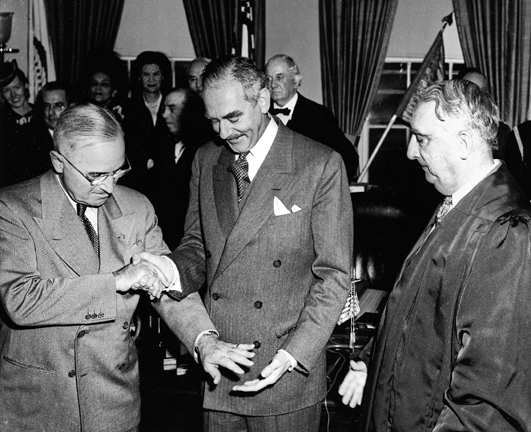
Harry Truman, Dean Acheson, and Chief Justice Fred Vinson in the Oval Office on January 21, 1949, at Achesons swearing-in as Secretary of State.
Introduction
The younger and taller of the two eminent Americans, the former Secretary of State, stood six foot one and, to judge by his exquisitely tailored suits and neatly trimmed, ever so slightly upturned mustache, he might have stepped from the pages of an English fashion magazine of the day. The other, older man, the former President of the United States, was a good three inches shorter and about as unmistakably midwestern American as anybody could be.
Where one, the patrician Dean Gooderham Acheson, had attended Groton, Yale, and the Harvard Law School, the other, Harry S. Truman, was the only President of the twentieth century who had no more than a high-school education. Truman was the son of a farmer; Acheson, the son of an Episcopal bishop. Acheson had begun his rise in the profession of the law under the tutelage of the learned Supreme Court Justice Louis Brandeis. Truman owed much of his success in the rough-and-tumble of Missouri politics to the notorious boss Tom Pendergast. Acheson was known to suffer fools hardly at all, Truman had long since become a master of the art. Truman, as he said, liked a little H2O flavored with bourbon, Acheson preferred his martinis extremely dry.
At the time the correspondence in these pages began, early in 1953, both men had come to regard themselves as oldsters, to use Trumans word. He was sixty-nine, Acheson, sixty, and they seemed still, as they had at the summit of their careers, as incongruous a pair as might be imagined, separated now not only by the thousand miles between Independence, Missouri, and Washington, D.C., but by so much else that was obviousthat is, if one chose to judge only by the obvious.
For as conspicuously different as they were in background, appearance, and manner, they were two principled men who lived by the same code, and, importantly, each had the capacity to see beyond what met the eye. Truman had understood at once how much more there was than the fashion plate to Acheson. Acheson had seen from the beginning the rare common sense and underlying greatness of the plainspoken supposed nobody who had taken the place of the fallen Franklin Roosevelt.
Some similarities between the two were as marked as the differences. Both had a small-town background. (Acheson came from Middletown, Connecticut.) Both loved booksand history and biography in particular. (The breadth of Harry Trumans readingthe fact that he read Latin for pleasure, for examplecame as a surprise to those who did not know him.) Both liked a morning walk at a good clip and neither had the least ability to speak any language other than his own. If Acheson paid inordinate attention to how he looked, Truman was not far behind with his bow ties, his invariably well-pressed suits, crisp shirts, and insistence that five points of a fresh handkerchief be showing just so from his breast pocket. The failed haberdasher, as his critics liked to label him, loved clothes and from boyhood had cared very much about how he looked.
In explanation of Achesons attention to wardrobe, his son, David, has written that it was not vanity so much as part of a perfectionist drive that touched everything he did. To a degree that could be said of Truman as well.
Both men were devoted to their wives and families. Each had an active sense of humor and was capable of laughing at himself. And they were both profound patriots. An unfailing loyalty to their country was bedrock to their code and one of their strongest bonds.


